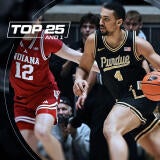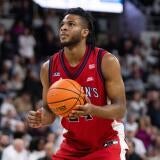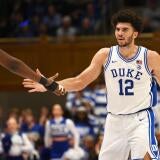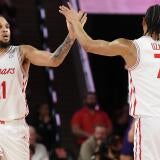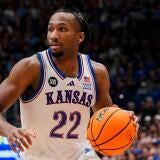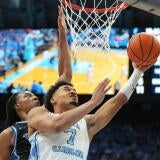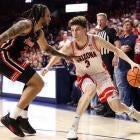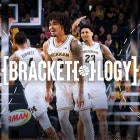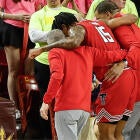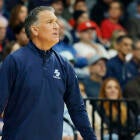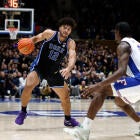
New North Carolina coach Hubert Davis has made changes in Chapel Hill, faces first big test vs. Purdue
Davis, in his first year as UNC's coach, will lead the storied program against the No. 6 Boilermakers in the Hall of Fame Tipoff Classic

CHARLESTON, South Carolina -- An assistant coach who gets promoted to head coach only moves on the sideline about 18 inches, from one chair to the next. In terms of length, there's not much difference.
But ...
"It's a big difference," acknowledged North Carolina's Hubert Davis, who replaced Naismith Memorial Hall of Famer Roy Williams after last season and is now 3-0 as the Tar Heels' first-year head coach following Tuesday night's win at College of Charleston. "A lot of people ask me, 'What's the difference between being an assistant coach and being a head coach?' As an assistant coach, you know, all day, you're just making suggestions. But as a head coach, you're all day making decisions. And that's the biggest difference."
Hubert Davis will spend Saturday coaching his first game against a nationally ranked opponent when his No. 18 Tar Heels play No. 6 Purdue in the Hall of Fame Tipoff Classic at Mohegan Sun. If you watch, you should notice quickly that Davis has already made decisions to change the way UNC operates.
Unlike in years past, the Tar Heels are not playing two traditional bigs together, instead opting for more versatile lineups with shooting. The best way to demonstrate this is to highlight how Brady Manek is starting at power forward and attempting five 3-pointers per game. Last season, Garrison Brooks started at power forward and attempted eight 3-pointers all season. Furthermore, this season, North Carolina is shooting 38.7% from 3-point range on 20.7 attempts per game. Last season, the Tar Heels shot just 31.7% from beyond the arc on only 17.1 attempts per game.
None of this is an accident.
It's all very deliberate.
"I want guys who are able to shoot," Davis said. "A lot of people talk about spacing and balance and movement. Well, it's real easy to get that if you have guys who can shoot. … We have six or seven guys on our team who can go for 20 points on any given night. They can really shoot the basketball, and it's really opened up our offense and given us the ability to attack the basket in many different ways."
Offensively, things are undeniably different but still good, per usual at UNC. The Tar Heels are ranked 17th in adjusted offensive efficiency, according to KenPom.com. But it's another deal on the other end of the court, where they allowed Brown to shoot 50.7% from the field in the Game 2 of the season, then let Charleston score 83 points in Game 3. The byproduct of that has North Carolina ranked 105th nationally in adjusted defensive efficiency, according to KenPom. That could prove problematic Saturday against an undefeated Purdue team that's ranked second in adjusted offensive efficiency and averaging 94.7 points per game.
Either way, Game 4 of the Hubert Davis Era is now just hours away, a high-profile non-league game that'll lead to a Sunday showdown against either No. 5 Villanova or No. 17 Tennessee. It comes as the former Tar Heel player turned Tar Heel assistant turned Tar Heel head coach has already adjusted the way the program operates on the court to better reflect the way he wants his teams to play. And, yes, of course, he understands that replacing a legend like Williams is a challenge in a traditional sense -- but Davis, in the second week of his head-coaching career, insists he really doesn't view it that way.
He doesn't feel pressure as much as he says he feels appreciative that he was trusted enough to be handed the keys to a blue blood program in the state where he was born and on the campus where he played. Perhaps that perspective will change someday; this profession can take a toll. But for now, Davis is still in a place where he rejects the idea that coaching at the tip-top of the sport is a "challenge."
"People always ask, 'Is this a challenge -- being the head coach at the University of North Carolina?' and I say, 'Absolutely not,'" Davis said. "To have an opportunity every day to be around these kids and to help them and encourage them and teach them and coach them, to be able to do it in a game I've loved my entire life at an institution and program that I've always wanted to be a part of my entire life, it's not work. It's missionary work. It's an act of service to give back to these kids everything that Coach [Dean] Smith and Coach [Bill] Guthridge gave to me, and it's an honor and a privilege to be able to do that every day."


